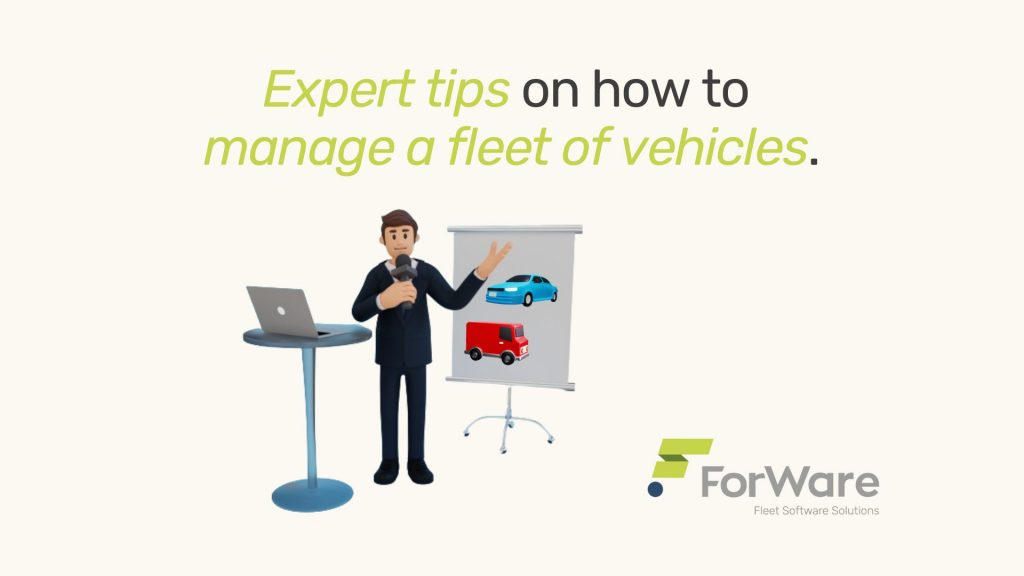
ForWare is all about making automotive fleet management easier and slicker, without cutting corners. We often get asked for advice on effective fleet management techniques. Having experience on both the fleet and service sides of the automotive industry, I thought I’d put together this short article going through some of my top tips on how to manage a fleet of cars or vans.
Good record-keeping is essential to expertly managing a fleet of vehicles. Easy, ready access to service history and VHC records will be invaluable when it comes to processing a warranty claim quickly. Should you find yourself short of a service record, this may well result in the warranty claim being rejected and costly repairs being passed on to the fleet company—can you imagine having to explain to your CEO that thousands of euros in repair costs could have been completely avoided had you just kept proper records? That’s not a position that anyone wants to be in. An efficient automotive fleet management system, such as ForWare, stores all your service and VHC records digitally so you can literally call them up at the tip of your fingers. Having good records will also help when it comes to fleet replacement time, for you analyse if particular vehicle types gave more trouble than others, or proved unsuited to their use, etc.
Automotive service intervals are set as they are for good reasons, so if a manufacturer specifies that your fleet needs a service every X km or Y months, then it would be foolhardy to ignore it. Of course, when you’re managing a large fleet of cars or vans this can become quite unwieldy without adequate planning, and this is another reason why investing in a comprehensive automotive fleet management system is key to efficient fleet maintenance. For example, ForWare gives you notifications as and when a given vehicle’s service draws near, so you’ll have time to plan in advance. It also allows you to book a service or VHC with your chosen workshop. If that workshop is at full capacity, you have the option of using the ForWare Workshop Network to find alternatives.
You can have the best-maintained automotive fleet in the world, but without due care and diligence from drivers, your fleet efficiency can fall apart very quickly. It pays to engage with your drivers and ensure that they are appropriately trained in the handling of your fleet and any idiosyncrasies associated with certain vehicles. Again, service records can help here, for instance, is there one driver whose vehicle is frequently in for gearbox repairs? It may be worth talking to them about their clutch use. Are some vehicles heavier on fuel than others, despite driving a similar route? Again, individual driver performance may be at play here.
Horses for courses is a phrase as applicable to the fleet management sector as it is to any industry. Good fleet management takes into account the nature of jobs individual vehicles will be allocated to. For example, if your fleet includes security vehicles that will spend most of their day meandering up and down a small site at low speed, then you need to be mindful that vehicles with diesel particulate filters (DPF) aren’t well suited to short journeys. If you manage a fleet of vans, then you need to factor in the loads they’ll be carrying, as this will have an impact on not only vehicle size but engine capacity too.
The more systems you use to manage your fleet of cars or vans, the more work you’ll have to do. And the margin for error will be higher too. Think about it. If you have one system for service record keeping, one system for booking services, and another system for compliance records, then you’ll end up having to input the same data multiple times and incur a lot of double/triple handling. This problem will be compounded if it turns out one of the systems isn’t easily integrated with the others or those of your workshop partner. ForWare covers multiple aspects of automotive fleet management, including all the areas listed above. It is also fully compatible with DMS systems such as Keyloop.
I hope the above has been informative, and shown you that good automotive fleet management doesn’t have to be as daunting or stressful as it’s sometimes made out to be. In essence, all you need is a good system at your disposal. If you’d like to find out more about how ForWare can help streamline your fleet operations or arrange a free demo, please give me a call at 021 484 5550 or email me at alan@forware.io.

Alan is a positive and proactive automotive professional with over 25 years of extensive experience in the motor trade.
Alan has been vital in developing and driving the ForWare System and implementing core workshop processes with some of the most significant state and private fleets in Ireland, the UK and Europe.
Schedule a FREE consultation today to see how we can make life easier for all involved—you, your colleagues, your customers and your fleet.
By subscribing, you’ll always be the first to know about the latest articles, freebies and special offers from ForWare. So go ahead and sign up now!